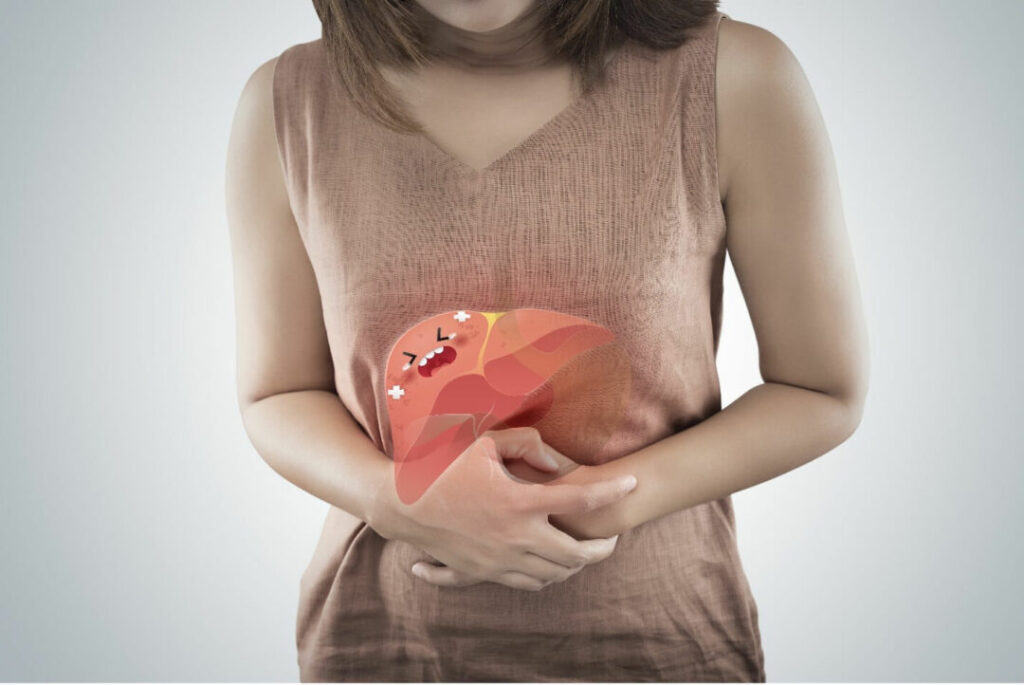Liver Disease

Liver Transplant Surgeon In Nagpur, Maharashtra
Dr. Manish Upwanshi is the Best Liver Transplant Surgeon in Nagpur Maharashtra. The liver is an organ about the size of a football. It sits just under your rib cage on the right side of your abdomen. The liver is essential for digesting food and ridding your body of toxic substances. Liver disease can be inherited (genetic). Liver problems can also be caused by a variety of factors that damage the liver, such as viruses, alcohol use and obesity.
Over time, conditions that damage the liver can lead to scarring (cirrhosis), which can lead to liver failure, a life-threatening condition. But early treatment may give the liver time to heal.
Fatty Liver Symptoms
Liver disease doesn’t always cause noticeable signs and symptoms. If signs and symptoms of liver disease do occur, they may include:
- Skin and eyes that appear yellowish (jaundice)
- Abdominal pain and swelling
- Swelling in the legs and ankles
- Itchy skin
- Dark urine color
- Pale stool color
- Chronic fatigue
- Nausea or vomiting
- Loss of appetite
- Tendency to bruise easily
When to see a doctor
Make an appointment with your doctor if you have any persistent signs or symptoms that worry you. Seek immediate medical attention if you have abdominal pain that is so severe that you can’t stay still.
What causes different types of liver disease?
Different types of liver disease result from different causes. Liver disease may result from:
- Viral infections: Hepatitis A, hepatitis B and hepatitis C are diseases caused by a viral infection.
- Problems with your immune system: When your immune system mistakenly attacks your liver, it can cause autoimmune liver diseases. These include primary biliary cholangitis and autoimmune hepatitis.
- Inherited diseases: Some liver problems develop because of a genetic condition (one you inherit from your parents). Inherited liver diseases include Wilson disease and hemochromatosis.
- Cancer: When abnormal cells multiply in your liver, you may develop tumors. These tumors may be benign (noncancerous) or malignant (liver cancer).
- Consuming too many toxins: Alcohol-related fatty liver disease is the result of alcohol use. Non-alcohol related fatty liver disease (NAFLD) results from consuming too much fat. NAFLD is becoming more common as rates of obesity and diabetes rise.
What are the symptoms of liver disease?
Some types of liver disease (including non-alcohol fatty liver disease) rarely cause symptoms. For other conditions, the most common symptom is jaundice — a yellowing of your skin and the whites of your eyes. Jaundice develops when your liver can’t clear a substance called bilirubin.
Other signs of liver disease may include:
- Abdominal (belly) pain (especially on the right side).
- Bruising easily.
- Changes in the color of your urine or stool.
- Fatigue.
- Nausea or vomiting.
- Swelling in your arms or legs (edema).
What are the complications of liver disease?
Some types of liver disease can increase your risk of developing liver cancer. Others, if left untreated, continue to damage your liver. Cirrhosis (scarring) develops.
Over time, a damaged liver won’t have enough healthy tissue to function. Liver disease that isn’t treated can eventually lead to liver failure.
What are the complications of liver disease?
Some types of liver disease can increase your risk of developing liver cancer. Others, if left untreated, continue to damage your liver. Cirrhosis (scarring) develops.
Over time, a damaged liver won’t have enough healthy tissue to function. Liver disease that isn’t treated can eventually lead to liver failure.
How is liver disease diagnosed?
To accurately diagnose and find the cause of liver disease, your provider will also recommend one or more tests. These may include:
- Blood tests: Liver enzymes measure levels of liver enzymes in your blood. Other tests of liver function include a blood-clotting test called the international normalized ratio (INR). Abnormal levels may indicate problems with your liver function.
- Imaging tests: Your provider can use ultrasound, MRI or CT scan to look for signs of damage, scarring or tumors in your liver. Another specialized type of ultrasound called fibroscan can be used to determine the degree of scarring and fat deposition in the liver.
- Liver biopsy: During a liver biopsy, your provider uses a thin needle to remove a small sample of liver tissue. They analyze the tissue to look for signs of liver disease.
How is liver disease managed or treated?
Treatment for liver disease depends on the type of liver disease you have and how far it has progressed. Possible treatments include:
- Medications: Healthcare providers treat some types of liver disease with medication. You may take medicine for viral infections like hepatitis or inherited conditions like Wilson disease.
- Lifestyle changes: You can use your diet to help manage certain types of liver disease. If you have fatty liver disease, avoiding alcohol, limiting fat and calories and increasing fiber intake can help. Alcohol-related liver disease can improve with abstinence from alcohol.
- Liver transplant: When liver disease progresses to liver failure, a liver transplant may be the best treatment option. A transplant replaces your liver with a healthy liver.
Can liver disease be prevented?
You can take steps to prevent some types of liver disease — especially those affected by your diet and lifestyle. If you are at risk for liver disease, your provider may recommend lifestyle changes including:
- Avoiding or limiting alcohol.
- Avoiding foods and drinks that contain trans fats or high-fructose corn syrup.
- Carefully managing your intake of prescription and over-the-counter medications to avoid liver damage, as medications like acetaminophen (Tylenol®) are a common cause of liver injury.
- Getting regular exercise.
- Limiting consumption of red meat.
You can minimize the likelihood of contracting viral hepatitis by practicing safe sex and not sharing needles.
What questions should I ask my doctor?
You may want to ask your healthcare provider:
- What lifestyle changes should I make to help keep my liver healthy?
- What early warning signs of liver disease should I watch out for?
- Should I avoid any medications to help prevent liver damage?
- If I have an inherited liver disease, should my family get genetic testing?
- Will I need to have a liver transplant?
